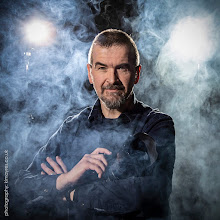Father and Son
I would refer directly to some of the stuff in it, but my copy seems to be on permanent loan to 30 and 40 something guys I know. As soon as it comes back to me it ends up being lent to someone else.
However, seeing my father in shop window reflections since I got the hat (see last post), and reading BStrong’s moving post last week has had me mulling over one aspect of Biddulph’s book in particular.
A son’s relationship to his father is a very powerful influence on how he turns out. Many men spend their entire lives trying to live up to their father’s expectations and others spend their entire lives kicking against the old bastard.
According to Biddulph’s experiences through many workshops, about 30% of men have such a dire relationship with their father that they have absolutely nothing to do with him and haven’t spoken to him in years. Another 30% are in contact with their father but every time they speak it breaks down into a blazing argument. 30% more are in relatively frequent contact with their father but conversation never gets deep or significant. It never really progresses much beyond talking about the weather, the match or everyday stuff.
Apparently only 10% of men actually talk of their father as a friend, someone for whom they have the greatest respect and a great relationship.
Only 10%
I would love my relationship with my father to be in that 10%, but truth be told it isn’t. We don’t fight or argue, but he has always been distant. Many times I have tried to bridge that gap, and we have had the occasional deep and emotional talk, but it has always come from me, and he has always been guarded about revealing himself. That’s part of who he is, how he has responded to his upbringing and the events in his life. His relationship with his own father was caustic and hostile, so at least he made progress with us.
But what does this 10% figure say about our chances, as fathers, of having the kind of bond with our sons that we intend? How does it all go so wrong?
When Rogan was born, my sense of fatherly pride was overwhelming. I knew that I was going to show him how to live life to the full, how to make the most of his talents, how to be a good person, how to be successful in any endeavour, how to be an inspiration to others. In other words, how to be the kind of guy I wish I could be.
But what happens as they grow up? Where are we as fathers? We are working all the hours available to try and provide for our children. We are tired when we get home and just want to watch the TV, eat and unwind. By the time we are feeling human again, the kids are usually in bed. So instead of being this guiding light, teacher, inspiration and mentor, we end up being a distant figure that moans about the bills and is frequently grumpy. Not the role model we ever intended to be.
By the time our son is a teenager and turning into a man, right at the point when we feel we have so much knowledge that we could impart to make his life so much easier, we find that we don’t have the direct influence we expected. He will be making his own, often completely stupid, decisions and will refuse to take our advice. The relationship breaks down further, all our great intentions have vanished into the ether, and the time for being the kind of father we always meant to be has gone forever.
My son is now 10 and is one of the contributing reasons to why I sold my business and we changed our lifestyle so completely. I remember last year when he turned 9 and all I could think was “Nine? How the bloody hell did he get to be nine? He wasn’t yet three when I started up my business!”
So now I’m trying to be more a part of his life, but already I can feel my influence slipping. Puberty is in the air and he’s not so keen to give me a hug, be tickled, or say hello to me in the playground when I go to collect Meg from school.
I remember my mother once saying to me that you don’t really get to know whether you’ve brought your kids up right until they’re about 35. Then you can see how well adjusted they are. Of course it’s a bit late by then to make any corrections.






Post a Comment